“Tianjin Forum 2021” Kicks off in Tianjin
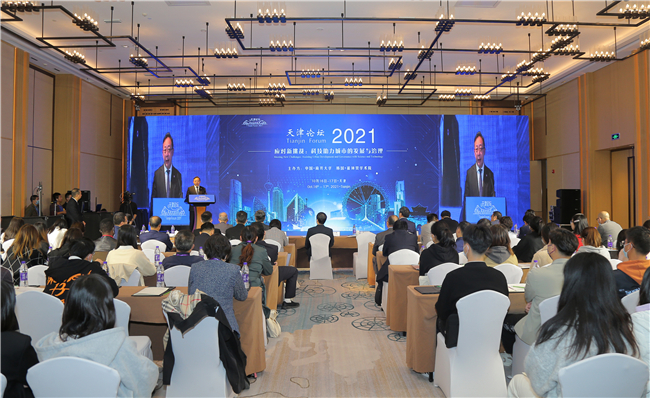
Themed on “Meeting New Challenges: Technology Boosts Urban Development and Governance”, “Tianjin Forum 2021” was held in Tianjin City on October 16-17. More than 200 participants from 18 countries, including South Korea, Japan, the United States, France and Germany etc., attended the meeting online or in person. By sharing and exchanging cutting-edge technologies and theories, they analyzed new problems, summarized new experience, and explored how to use new technologies to improve research methods on urban and regional governance against the new context and to push forward interdisciplinary research on urban and regional development and governance.

Sun Wenkui, vice mayor of Tianjin City, Laurent Fabius, president of the France’s Constitutional Council and honorary doctor of Nankai University, Li Yong, director-general of the United Nations Industrial Development Organization (UNIDO) and an alumnus of Nankai University, Park In-kook, president of the Chey Institute for Advanced Studies of the ROK, and Cao Xuetao, academician of the Chinese Academy of Engineering and president of Nankai University, attended the opening ceremony and delivered speeches in an online or person-to-person manner. Some scholars and guests were also present online or in person, including Gong Ke, president of the World Federation of Engineering Organizations (WFEO) and former president of Nankai University, Erik Berglof, chief economist of the Asian Infrastructure Investment Bank (AIIB), Xu Jianguo, academician of the Chinese Academy of Engineering and president of the Research Institute of Public Health, Nankai University, Xie Guangjun, vice president of Baidu, and Zhang Hui, senior director of Alibaba. Wang Lei, vice president of Nankai University, chaired the opening ceremony.
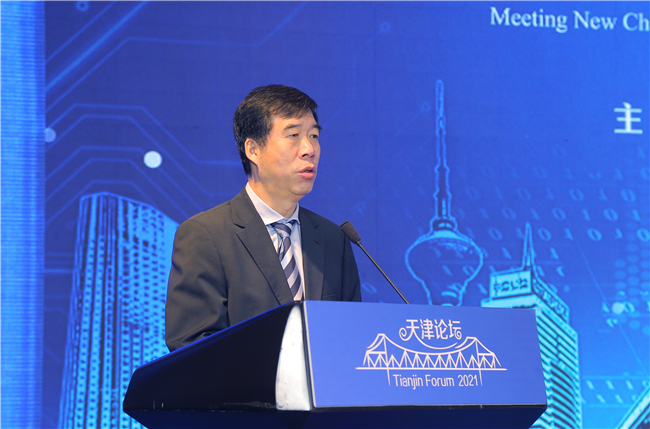
Sun Wenkui pointed out, “Since it was successfully held for the first time in 2015, Tianjin Forum has insisted on pooling global intelligence, planning for urban construction and sharing innovative achievements, thus becoming an important platform for promoting urban development and theoretical and practical innovations in governance. At present, Tianjin is in a critical period of city digitalization. We look forward to strengthening exchanges and cooperation with you to jointly promote AI-enabled urban development and governance, drive high-quality urban development and build high-performance cities.”
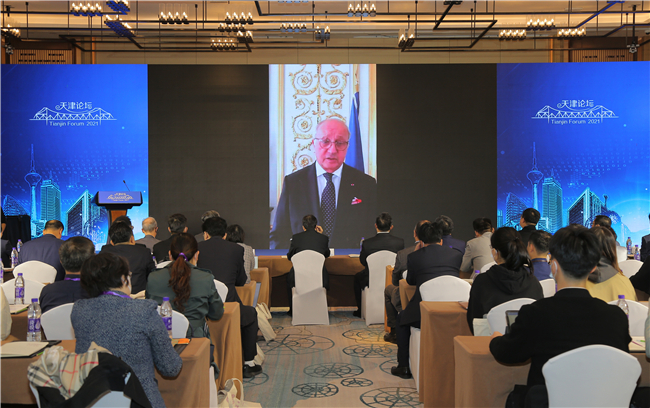
Laurent Fabius said that cities are at the forefront of the efforts in addressing various challenges such as COVID-19 and climate changes. Tianjin Forum took these challenges into account and brought relevant issues together for research and discussion to work out new collaborative solutions. He called for stronger international cooperation in response to climate changes and more proactive and more pragmatic actions should be made based on the actual conditions of all countries.
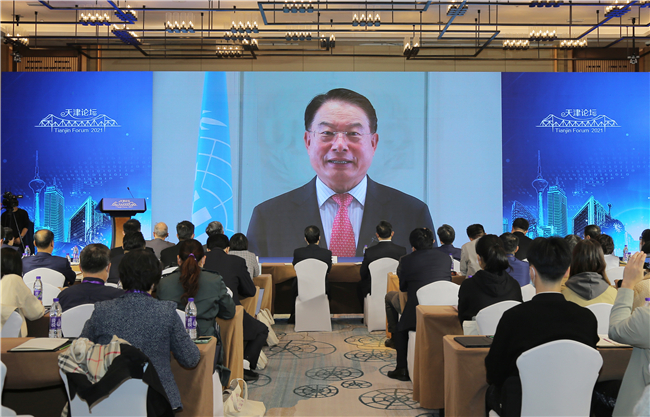
Li Yong said, science and technology play an important role in urban governance. Especially after the fourth industrial revolution, urban governance became much more efficient. All parties should fully strengthen the consensus, join hands to promote the renewal and development of the urban policy and technology system, strive to build a modern and resilient urban infrastructure system. Moreover, digitalization should be used to spur the innovation in urban development and governance models, in a bid to improve the operational efficiency and livability of cities in an all-round manner.
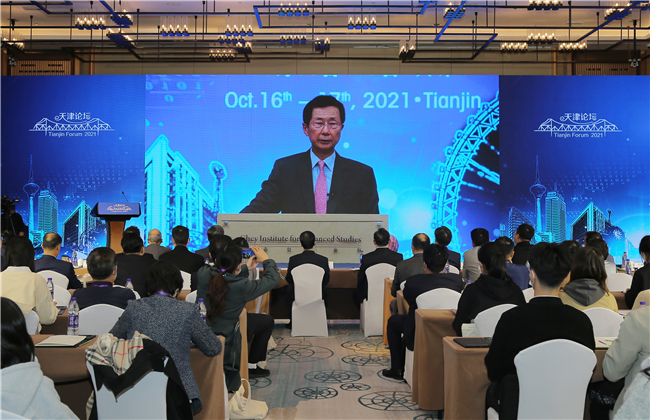
Park In-kook stated that Chey Institute for Advanced Studies and Nankai University have made joint efforts to hold Tianjin Forum, a move which is of great significance and has been widely recognized by people from all walks of life. He hoped that by exchanging ideas, sharing wisdom and building consensus around the forum theme, participants would explore ways to improve the resilience of cities and adopt new methods to realize sustainable development so as to better deal with the problems such as public health and safety, carbon neutrality, AI, urban space and renewal.

Cao Xuetao said, “Since its establishment, Tianjin Forum has made contributions in promoting cultural exchanges and mutual learning between countries and deepening cooperation in various fields, especially in propelling regional integration urban development and governance. At present, Tianjin has entered a critical period of development and Nankai University has started its second centenary journey. In the future, Nankai University will work hard together with all parties to translate Tianjin Forum into a bridge between academia and industry and an important platform for regional governance and urban development, so as to make new and greater contributions to the building of a community of shared future for mankind and a community of science and education innovation.


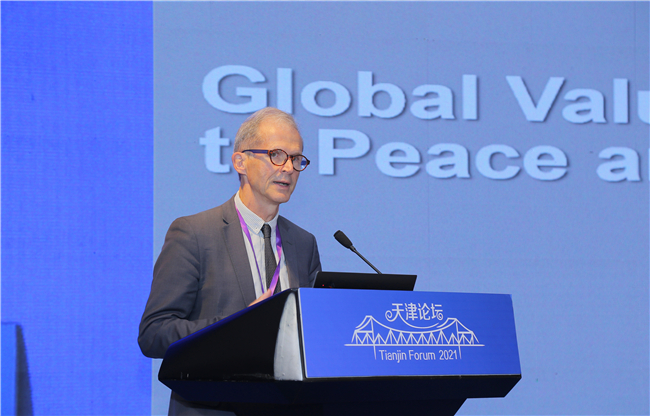

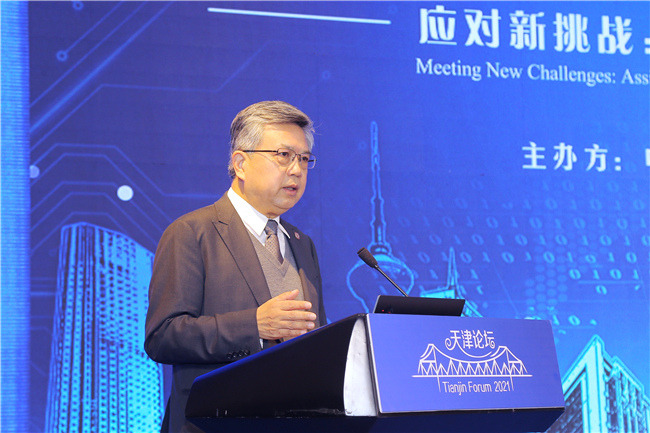
After the opening ceremony, Gong Ke hosted the keynote speeches of the forum. Participating experts delivered keynote speeches respectively on such topics as “Digital Technology in Sustainable Cities in Post-Pandemic Era: Balanced and Inclusive Green Growth (BIGG)”, “Global Value Chain Boosts Peace and Prosperity in Asia”, “Sustainability, an Important Feature of Architectural Design”, and “Smart Cities, Testbed for Future Smart Living.
There were six sub-forums and two round-table conferences held on October 16-17. Participating scholars and guests conducted in-depth discussions around the topics including “Public Health Safety in the Context of Sustainable Urban Development”, “Urban Brain in Urban Governance Innovation”, “Building a High-Quality Urban Space “, “New Challenges for Urban Governance System”, “Symposium on Carbon Peak and Neutrality in Cities”, “Regional Cooperation and East Asian Order Amid Momentous Changes Unprecedented in a Century”, “Smart Technology and Urban Competitiveness” and “Happiness-oriented Urban Renewal and Cultural Tourism Innovation”.
(Reported by Fu Kun and Wu Junhui, photographed by Wu Junhui, edited and translated by Nankai News Team.)









